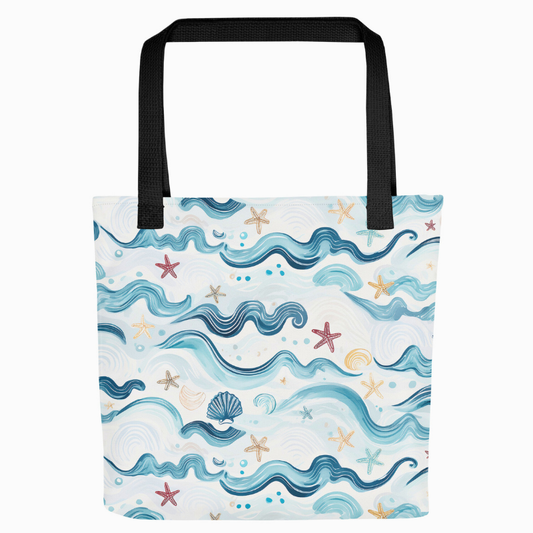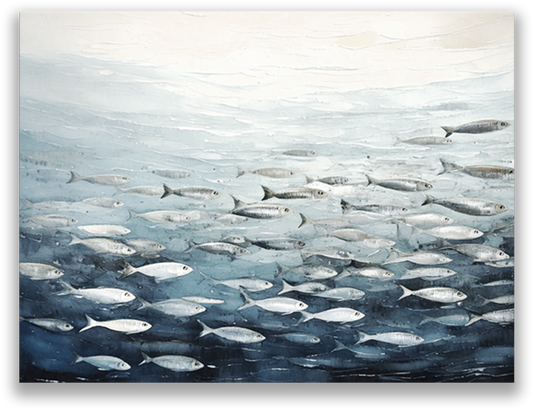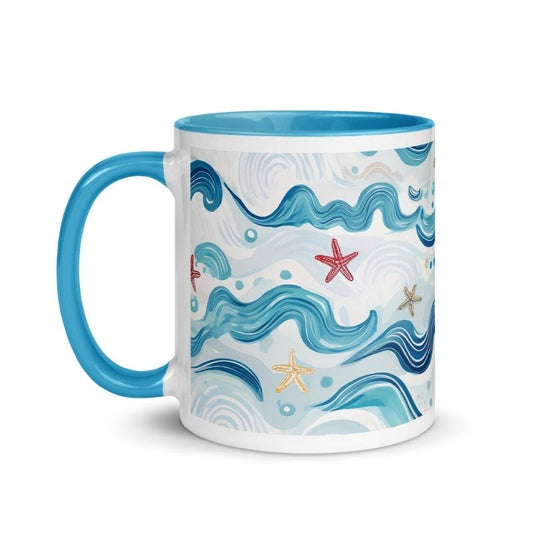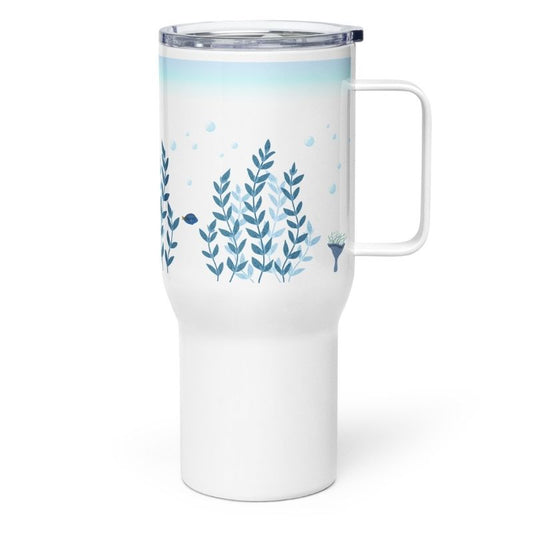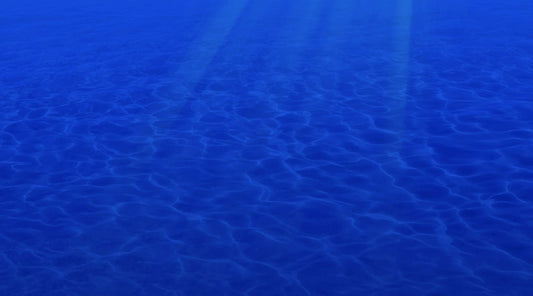
Relaxing on the beach: negative ions or calming blue?
Share
The beach is so relaxing and calming. Is it the negative ions, the calming blue, or the ocean wave sounds?
There's something magical about the beach that instantly puts us at ease. Whether it's the soothing sound of the waves, the salty breeze, or the endless stretch of blue, the beach has a unique way of helping us unwind.
But what exactly makes the beach so calming and relaxing? In this post, we'll break down the science behind that beachside bliss. We'll look into the role of negative ions, how the parasympathetic nervous system kicks in, and why the water sounds of the ocean are so mesmerizing. We'll also explore the positive impact of sea air, the calming effect of the color blue, and how all these factors come together to reduce stress and improve our health.
Let's dive in and discover why the beach is the ultimate relaxation destination.
Negative Ions Increase Oxygen to the Brain
Negative ions are molecules that have gained an extra electron. They are found

abundantly in natural environments like forests, waterfalls, and beaches. Researcher’s began exploring the effects of negative ion effects on human health and mood back in the early 20th century. These ions are believed to increase the flow of oxygen to the brain, resulting in higher alertness, decreased drowsiness, and more mental energy.
Studies suggest that negative ions can have numerous health benefits, from improving mood to alleviating symptoms of depression and anxiety. For example, research conducted in the 1980s found that people exposed to high levels of negative ions reported feeling more refreshed and had improved cognitive function. However, while the potential benefits are promising, science doesn’t fully understand how negative ions function regarding health and mood. Some studies show significant positive effects, while others indicate only minimal impact.
Either way, most people find that being near the ocean, where negative ions are plentiful, leaves them feeling rejuvenated and relaxed. Most believe these ions increase oxygen atoms to the brain. The beach environment, with its abundance of negative ions, combined with other calming factors like the sound of waves and the blue color of the sea, creates an overall sense of well-being that is hard to replicate elsewhere. Whether it's the ions themselves or a combination of natural elements, the beach undoubtedly offers a unique setting for stress relief and mental benefits.
Parasympathetic Nervous System Lets Us Rest
The parasympathetic nervous system (PNS) is a crucial part of our autonomic nervous system, which handles the functions our body performs automatically, like heart rate, digestion, and breathing. Think of the PNS as the "rest and digest" system. It works to calm the body after stress, lowering the heart rate, reducing blood pressure, and promoting digestion. This system helps us relax, conserve energy, and maintain a balanced state, counteracting the "fight or flight" response driven by the sympathetic nervous system.
Being at the beach naturally stimulates the PNS. The soothing sounds of the waves,

the gentle sea breeze, and the calming blue of the ocean all work together to activate this system. As a result, we feel more relaxed and at ease.
This activation of the PNS is one of the reasons why a day at the beach can leave us feeling so refreshed and rejuvenated. The beach environment encourages our bodies to switch into a mode of rest and recovery, helping to reduce stress and promote overall well-being.
The beach environment, with its combination of calming sounds, expansive views, and soothing colors, provides an ideal setting for stimulating the parasympathetic nervous system (PNS). When we surround ourselves in the tranquil atmosphere of the beach, the PNS responds by slowing our heart rate, lowering blood pressure, and promoting a state of relaxation.
The rhythmic sound of waves crashing against the shore and the gentle sea breeze act as natural stimuli that encourage the activation of the PNS. Moreover, the view of the vastness of the ocean horizon and the calming blue hues of the ocean water contribute to this relaxation response, enhancing our overall sense of well-being. This natural synchronization between the beach environment and the PNS not only reduces stress in the moment but also promotes long-term benefits for mental and physical health.
Rhythmic Ocean Waves Comfort Us
The sound of ocean waves is one of the most universally recognized and soothing

natural sounds. The rhythmic ocean sounds, often described as white noise, has a calming effect on the brain. Studies have shown that listening to the sound of waves can help synchronize brain waves, leading to a state of relaxation and mental clarity.
This phenomenon, known as brainwave entrainment, helps reduce stress levels and promotes a sense of peace. The consistent and predictable rhythm of the waves mimics the patterns of our bodily rhythms, such as our heartbeat, creating a comforting and stabilizing effect.
Open spaces, like the vast expanse of the ocean, also contribute to this sense of calm. When we stand at the shore and gaze out at the seemingly endless horizon, our brain perceives this as a safe and unthreatening environment.
This visual stimulus helps reduce the production of stress hormones like cortisol, while increasing the production of feel-good hormones like serotonin and endorphins. The openness of the ocean contrasts sharply with the often crowded and cluttered environments of our daily lives, providing a mental and emotional reprieve.
The color blue, predominant at the beach, plays a significant role in enhancing this calming experience. Blue is widely recognized as a color that induces calm and tranquility. Research indicates that exposure to the color blue can lower heart rates and reduce blood pressure.
The vast blue sea, combined with the clear blue sky, creates a powerful visual effect that reinforces feelings of serenity and well-being. This combination of soothing sounds, open space, and calming colors makes the beach an ideal environment for relaxation and stress relief.
The color blue, predominant at the beach, plays a significant role in enhancing this calming experience. Blue is widely recognized as a color that induces calm and tranquility. Research indicates that exposure to the color blue can lower heart rates and reduce blood pressure.
The vast blue sea, combined with the clear blue sky, creates a powerful visual effect that reinforces feelings of serenity and well-being. This combination of soothing sounds, open spaces, and calming colors makes the beach an ideal environment for relaxation and stress relief.
The Sea Air Has Minerals & Negative Ions
Sea air is widely recognized for its substantial health benefits, backed by scientific

evidence. The ocean air is rich in negative ions, which have been shown to elevate serotonin levels in the body. Serotonin, a key hormone in mood regulation, contributes to feelings of relaxation and well-being, potentially alleviating symptoms of depression and anxiety. This natural boost in serotonin can significantly improve overall mood and mental clarity, enhancing the therapeutic effects of seaside environments.
In addition to its mental health benefits, sea air also offers notable physical advantages. The salty sea air contains fine droplets of seawater infused with minerals like sodium, magnesium, and iodine. Inhaling this mineral-rich, fresh air has been found to effectively cleanse and support the respiratory system, providing relief for conditions such as asthma, bronchitis, and allergies.
The moist, saline air acts as a natural expectorant, helping to thin mucus and reduce inflammation in the airways, facilitating easier breathing. Furthermore, sea air tends to be cleaner and less polluted than urban environments, as the vast ocean acts as a natural air purifier by dispersing pollutants. This cleaner air quality can contribute to improved lung function and overall respiratory health. The combination of negative ions, mineral-rich moisture, and reduced pollution levels makes sea air a powerful asset in promoting both mental and physical well-being, offering rejuvenation and vitality to those who indulge in coastal atmospheres.
The Color Blue is Linked to Tranquility
The sight of the ocean full of the color blue, predominant at the beach and in the

ocean, is intrinsically linked to feelings of calm and tranquility. Psychologically, blue is known to have a calming effect, often associated with peace and serenity. When we gaze at the vast blue ocean and the clear blue sky, our brain responds by lowering our heart rate and reducing blood pressure.
This soothing color helps to create a sense of stability and relaxation. The expansive blue of the sea also encourages us to feel more connected to nature, providing a mental escape from the stress and busyness of everyday life. This combination of visual beauty and psychological benefits makes the color blue a significant factor in why the beach feels so calming and rejuvenating.
The Beach Calms the Senses & Lowers Stress
The beach offers a multifaceted approach to calming effects and stress reduction,

making it a natural sanctuary for relaxation. One of the main contributors to this calming environment is the combination of sensory stimuli it provides.
The rhythmic sound of waves crashing against the shore creates a repetitive and soothing white noise that has been shown to lower cortisol levels—the hormone associated with stress. This rhythmic sound is thought to induce a meditative state, promoting relaxation and mental clarity. Coupled with the gentle sea breeze and the smell of salt in the air, these sensory experiences further enhance the calming effect, triggering a physiological response that lowers heart rate and promotes a sense of well-being.
Beyond sensory immersion, the beach environment encourages physical relaxation as well. Walking barefoot on the soft sand, known as grounding or earthing, connects us directly to the Earth's energy and has been linked to reduced inflammation, improved sleep, and stress reduction.
The tactile sensation of warm sand beneath our feet combined with the gentle warmth of the sun promotes a sense of grounding and stability, helping to alleviate anxiety and promote relaxation. Moreover, activities like swimming or floating in the buoyant seawater can have endless benefits, as water has been shown to have a calming effect on the nervous system, reducing muscle tension and promoting relaxation.
Psychologically, the beach offers a change in scenery that promotes mental rejuvenation and feelings of peace. The expansive horizon and open sky create a sense of freedom and possibility, encouraging a shift in perspective and reducing feelings of confinement or stress associated with urban environments.
The color blue, dominant in the ocean and sky, further enhances this effect by triggering associations with calmness and clarity. This combination of sensory, physical, and psychological factors makes the beach a powerful antidote to stress, offering not just temporary relief but also long-term benefits for mental and emotional well-being.

In conclusion, the beach is a natural haven for relaxation and well-being. The calming sounds of ocean waves, invigorating sea air rich in negative ions, and expansive blue vistas work together to reduce stress and enhance mood. These elements activate our parasympathetic nervous system, promoting both mental peace and physical health. Whether it's the relief of breathing mineral-rich air or the tranquility of the surroundings, spending time at the beach offers a holistic approach to rejuvenation and revitalization, making it the perfect escape for mind and body.

Don’t wait—these sales end soon, and they won’t be back!








